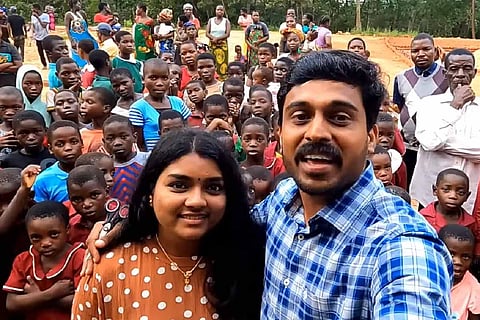

A school building in Chisasila, a village in the East African country of Malawi, is called Kerala Block. The Malayali connection behind the name and the building are a young couple—Arun Ashokan and Sumi. Malappuram-native Arun (30) went to Malawi four years ago, as part of his job as supervisor in a construction company. Two years back, he moved to Chisasila on a dam construction project, where he came across a leaking shed made of grass that functioned as the village’s elementary school. Images of the schools back home in Kerala flashed through his mind, and he decided to do something to improve its condition.
Speaking to TNM from Malawi, Arun recollects, “On my way to work, I used to see small children running to a shed made of grass. Some of them sat under the shade of trees, with blackboards in front of them. Even when the shed leaked, they would still sit in it. I realised only later that this was an elementary school arranged by people of the community, so that children aged six to nine years didn’t have to walk several kilometres to attend the government-run school.”
Arun says that a proper school building was not part of his initial plans. “I decided to do something as they were small kids and deserved better. The initial thought was to cover the existing shed with a sheet. But later, I decided that I wanted a good building for them,” he says. He shared his idea with Ashiq, one of his friends from the UAE. “I told him that I am going to start this project and will call him if and when I am stuck. He offered all help and told me not to wait till I got stuck,” Arun says. Ashiq contributed to the project financially.
Kerala Block of Chisasila School
As a first step towards constructing the school, Arun spoke to people from the village community, and requested them to provide the manpower. The villagers readily agreed. They made bricks on their own, as Arun couldn’t afford to buy them. With a small amount kept aside from his salary, he started to build his dream school in Chisasila. Slowly, his friend and colleague Kenneth Francis, who is a civil engineer, joined him.
Arun and Kenneth had been making steady progress on the building for a few months when Arun flew down to Kerala for his wedding with Sumi. When he arrived back in Chisasila, he had a great partner and resource person in his new wife. Sumi did everything she could to support Arun. Together with the villagers, the couple and Kenneth constructed the school building. Many who heard about their venture came forward to offer financial support. However, they did not accept any. “We wanted to do this ourselves, as charity. It took us 18 months to complete the work. Everything from making bricks, constructing, and painting was done by the villagers and us,” he says. Kerala Block has four spacious rooms.
On February 17, the school was inaugurated and classes started. After the successful construction of the school building, the couple came across another roadblock. The school did not have official recognition, which meant that students had to go to far away schools to sit for exams. “After we completed a proper building, the school got recognition up to class eight. The students no longer have to travel several kilometres to write exams,” Arun says.
Kerala Block has four spacious rooms
Once Arun and team started work on the school, the company they worked for also stepped in and built another small building for the school. Following this, a team from the United Nations, who were in the village for COVID-19 related work, also built a room.
The young philanthropic couple behind Kerala Block also run a Youtube channel called Malawi Diaries. The couple work among the children in the village in their free time. Sumi teaches the villagers new recipes that can be made from available resources, which has the potential to be developed into a cottage industry. “We get a lot of nendran bananas. The people here just boil it or eat it raw. We tried to teach them how to make chips out of it and sell them. Cassava recipes are also taught to them,” Arun adds.